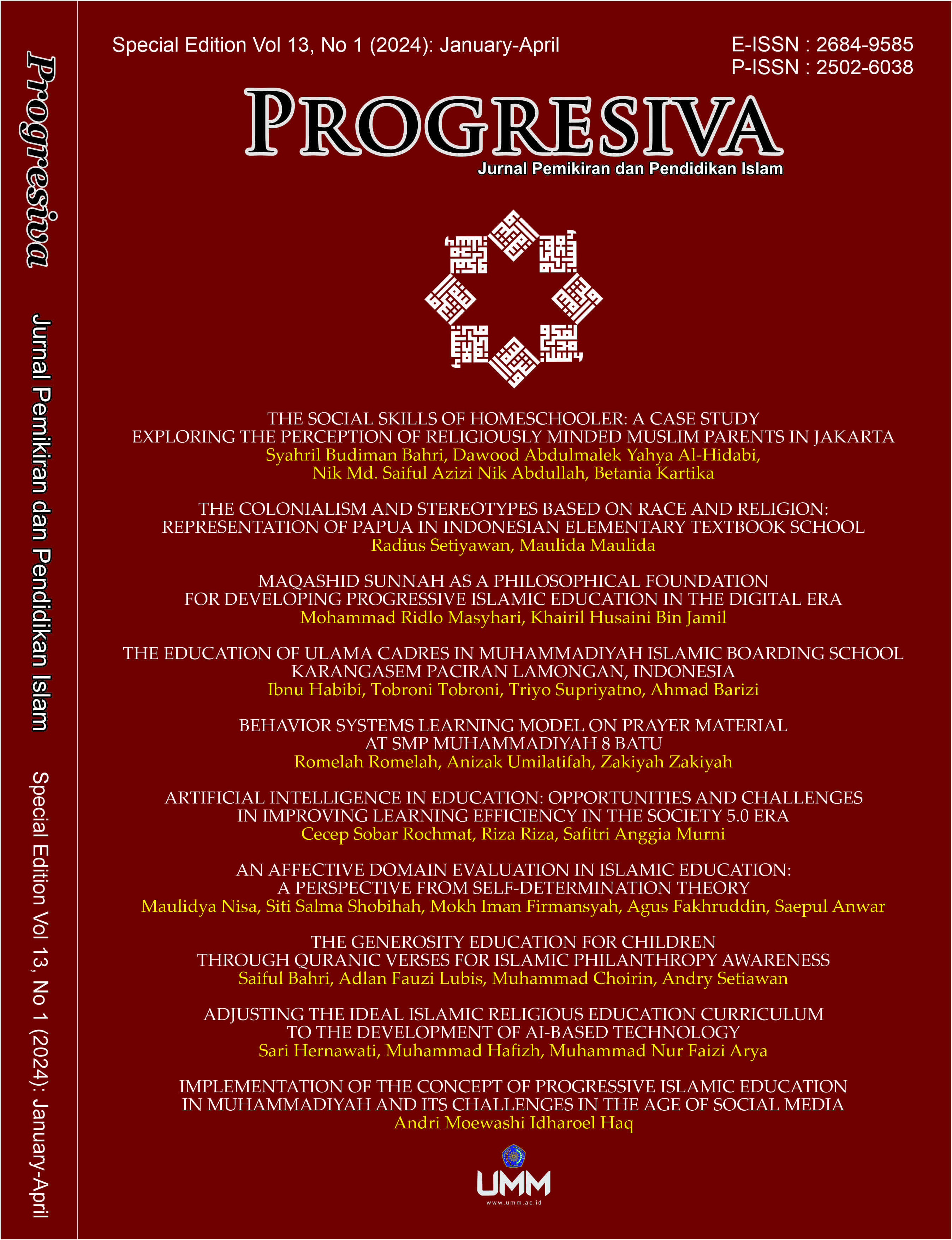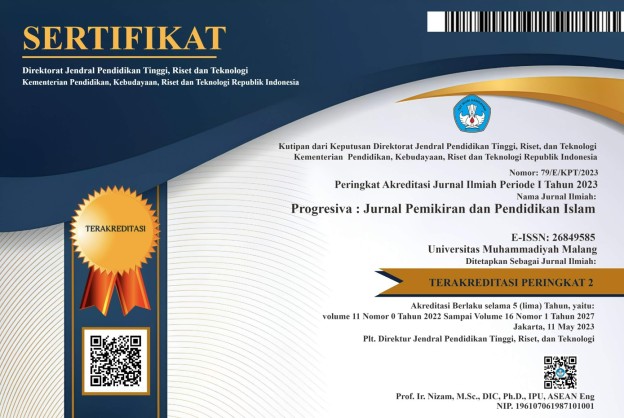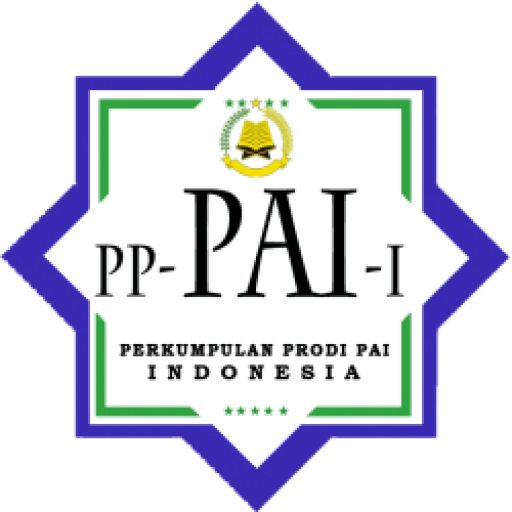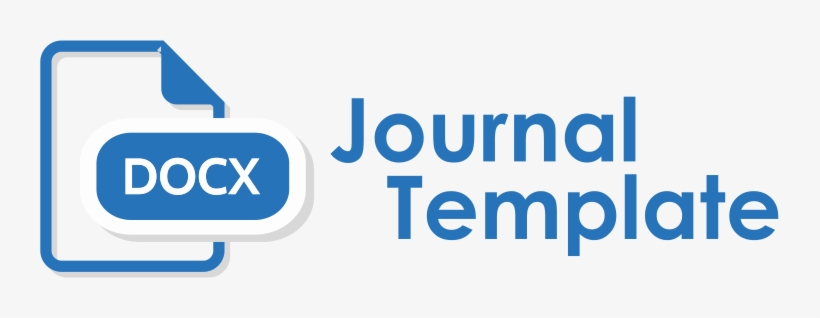Maqashid Sunnah as a Philosophical Foundation for Developing Progressive Islamic Education in the Digital Era
DOI:
https://doi.org/10.22219/progresiva.v13i01.32005Keywords:
Digital Era, Maqashid Sunnah, Progressive Islamic EducationAbstract
This article aims to look at the philosophy of Islamic education from the perspective of maqashid sunnah (the ultimate purpose of hadith) in the social sphere to produce progressive Islamic education in the digital era. The digital era is characterized by a very wide openness of information, causing competition in this era to be very tight, so competitive and productive human qualities are needed, and this can be produced from a progressive pattern of Islamic education. Unfortunately, Islamic education as an instrument for human development, currently focuses more on developing each student to achieve high skills and qualifications. Still, on the other hand, it can be seen that the output of this is humans who focus more on profits for themselves. It does not have much influence on people's lives, even though progress in its true meaning should be oriented towards the benefits of the wider community. For this reason, studies are needed to examine the philosophical basis of education to find solutions to the problems above. As a source of Islamic teachings, Hadith has a core purpose, maqashid sunnah. Among several maqasid sunnah, there is maqoshid riayat-al-Mujtama' or the aim of developing society, which contains values that lead to the development of society. This study will use a qualitative methodology by analyzing the values contained in the maqashid riayat-al-Mujtama and then bringing them into education to find their suitability as a basis for Progressive Islamic Education. The conclusion of this study is that maqosid riayat-al-mujtama, which contains social values in the form of freedom, helping each other in goodness, justice, equality, mutual love, and care, can be used as a philosophical basis for progressive Islamic education.
Downloads
References
Abdullah, M. A. (2017). Islamic studies in higher education in Indonesia: Challenges, impact and prospects for the world community. Al-Jami’ah, 55(2). https://doi.org/10.14421/ajis.2017.552.391-426
Abu Da’ud, S. ibn al-A. (2007). Sunan Abi Daud. Beirut. Maktabah al-Asriyyah.
Afisi, I. M., Humaidi, M. N., & Mukhlis, F. (2023). Education of the Salafi Dakwah in Changing the Worldview of the People in the Village of Sapugarabree, Sumbawa West District. Intiqad: Jurnal Agama Dan Pendidikan Islam, 15(2). https://doi.org/10.30596/16971
Afnanda, M; Nizma, A. L. . (2023). Landasan Pendidikan Agama Islam Dengan Profil Pelajar Pancasila di Era Kurikulum Merdeka. Jurnal Tarbiyah; Jurnal Ilmiah Kependidikan Dan Keagamaan.
Akil, M. ilham. (2023). Pendidikan islam progresif menurut muhammad iqbal [Skripsi]. universitas islam negeri walisongo semarang.
Akrom, M. (2021). Metamorfosa Pendidikan Islam Berbasis Pluralisme. Guepedia.
Al-Bukhari, A. ‘Abdullah M. ibn I. (2002). Shahih al-Bukhari. Beirut. Dar al-Kitab al-’Arabi.
Al-Dahlawi, S. W. A. (n.d.). Hujjat Allah al-Baligah. Dar Ibn Kathir.
Al-Darimi, ’Abd Allah ibn ’Abd al-Rahman. (2008). Sunan al-Darimi. Beirut. al-Maktabah al-’Asriyah.
al-Juwaini, A. M. (1997). al-Burhan fi Ushul Fiqh (4th ed.). Al-Wafa.
Al-Qazwini, I. F. (2011). Mu‘jam Maqayis al-Lughah. Beirut. Dar al-Kutub al-Ilmiyah.
Al-Syatibi, abu I. (2005). Al-Muwafaqat fi Ushul al-Syariah. dar el hadist.
Auda, J. (2008). Maqasid Al-Shariah as Philosophy of Islamic Law. In Maqasid Al-Shariah as Philosophy of Islamic Law. International Institute of Islamic Thought. https://doi.org/10.2307/j.ctvkc67tg
Bari, Abdul & Akrom, A. (2018). Maqosid al-Sunnah al-Nabawiyah Ghoir al-Tasyri’iyyah. Tajdid; IIUM, 20(44). https://journals.iium.edu.my/at-tajdid/index.php/tajdid/article/view/476/385
Baza, A. al-N. (2018). Minal Maqosid al-Tarbawiyah fi al-Qur’an al-Karim. ’Tujuan Pendidikan berlandaskan al-Quran al-Karim. Al-Furqon, 3. https://doi.org/http://doi.org/10.56656/101133.08
Brameld, T. (1995). Philosophies of Education. Holt, Rinehart and Winston, inc.
Danhas, Y. (2021). Analisis Pengelolaan Dan Kebijakan Pendidikan/Pembelajaran - Yunhendri Danhas - Google Buku. deepublisher.
Das, St. W. H., Halik, A., & -, A. (2016). Paradigm of Islamic Education in the Future: The Integration of Islamic Boarding School and Favorite School. Information Management and Business Review, 8(4), 24–32. https://doi.org/10.22610/imbr.v8i4.1390
Fahriana, A. S., & Huda, M. (2019). Application of Analysis of Strengths, Weaknesses, Opportunities, and Threats in Islamic Education Institutions. Istawa: Jurnal Pendidikan Islam, 4(1). https://doi.org/10.24269/ijpi.v4i1.1670
Gingras, Y. (2018). Religion and Science. Issues in Science and Technology, Vol. 34, N. https://www.jstor.org/stable/44577397
Gutek, G. L. (1974). Philosophical Alternatives in Education. Merrill Coordinated Teacher Preparation Series, 277.
Hakim, Lukman; Tobroni, Ishomuddin, K. (2020). Pendidikan Islam Integratif: Best Practice Integratif Pendidikan Agama Islam dalam Kurikulum Pendidikan Tinggi. Gestalt Media.
Hamka. (2020). Tafsir Al-Azhar. Panjimas. https://www.google.com.sa/books/edition/Tafsir_al_Azhar_Jilid_1/6bkSEAAAQBAJ?hl=id&gbpv=0
Haudi. (2020). Dasar-Dasar Pendidikan. PENERBIT INSAN CENDEKIA MANDIRI. www.insancendekiamanidiri.co.id
Heriyanti, S. (2021). Konsep Kebebasan Berpikir Perspektif Pendidikan Islam; Pemikiran Islam Fazlur Rahman. Jurnal Al-Aqidah, 2(1).
Hidayat, Tatang; Asyafah, A. (2018). Paradigma Islam dalam Metodologi Penelitian dan Implikasinya terhadap Penelitian Pendidikan Agama Islam. Tadrib: Jurnal Pendidikan Agama Islam, 4(2), 225–245. https://doi.org/10.19109/tadrib.v4i2.2507
Ibn al-Ḥajjaj, M. (2022). Shahih Muslim. Beirut. Dar Ihya’ al-Turath al-’Arabi.
Ibn Ashur, M. T. (2012). Maqoshid Al-Syariah Al-Islamiyah (5th ed.). Darussalam.
Ibnu Al-Atsir. (2009). An-Nihayah fi Gharib Al-Hadits wa Al-Atsar. Beirut. Dar al Fiqr.
Ibnu Hanbal, A. (2012). Musnad Imam Ahmad bin Hanbal. Riyadh. Darussalam.
Idris, M., & Mokodenseho, S. (2021). Model Pendidikan Islam Progresif. J-PAI: Jurnal Pendidikan Agama Islam, 7(2), 72–86. https://doi.org/10.18860/jpai.v7i2.11682
Iman binti Zaki. (2020). Qowaid al-Manhaj at-Tarbawi al-Mustanbatoh min al-Maqosid al-Syariah. Kaidah Metode Pendidikan yang Bersumber dari Maqosid Syariah. Journal of Al-Qadisiya in Arts and Educational Sciences, Iraq, 20(2).
Isna, Indri; Rohmatul, Iftah; tazayyun, I. (2017). Pendidikan Karakter menurut Aliran Essensialisme, Parennialisme, Progresivisme, dan Eksistensialisme. Universitas Muhammadiyah Sidoarjo.
Saiyidain, K. G. (1981). Iqbal’s Educational Philosophy. trans. M.I. Soelaeman. Diponegoro.
Kotsonis, A. (2020). What can we learn from Plato about intellectual character education? Educational Philosophy and Theory, 52(3). https://doi.org/10.1080/00131857.2019.1631157
Kurnia, A. R. D. (2020). Pengembangan Kurikulum IPA Terpadu SMP: Tinjauan Filosofis, Teoritis dan Contoh Implementasinya. PT. Panca Terra Firma. https://books.google.com.my/books?id=cn_sDwAAQBAJ&printsec=frontcover&hl=id#v=onepage&q&f=false
Masyhari, M. R. (2024). al-Maqosid al-Kulliyah li al-Sunnah al-Nabawiyyah fi dhow al-Shahihain. Trans. General Maqoshid of al-Sunnah al-Nabawiyah in the light of Sahihayn. [Doctoral Thesis (waiting for examination)]. International Islamic Universiti Malaysia.
Mualifah, I. (2016). Progresifisme John Dewey dan Pendidikan Patisifpatif Perspektif Pendidikan Islam. Jurnal Pendidikan Agama Islam (Journal of Islamic Education Studies), 1(1). https://doi.org/10.15642/pai.2013.1.1.101-121
Mudinillah, A., & Rizaldi, M. (2021). Using the Canva Application as an Arabic Learning Media at SMA Plus Panyabungan. At-Tasyrih: Jurnal Pendidikan Dan Hukum Islam, 7(2). https://doi.org/10.55849/attasyrih.v7i2.67
Muthohirin, N., Kamaludin, M., & Mukhlis, F. (2022). Transformasi Pendidikan Islam Salafi: Implikasi terhadap Multikulturalisme di Indonesia. The Annual Conference on Islamic Religious Education, 2(1), 1–24. http://acied.pp-paiindonesia.org/index.php/acied/article/view/14%0Ahttp://acied.pp-paiindonesia.org/index.php/acied/article/viewFile/14/22
Nabila, P. A. D., Humaidi, M. N., & Mukhlis, F. (2023). Pembinaan Karakter Cinta Tanah Air Melalui Habituasi: Sekolah Dasar Islam Terpadu (SDIT) Robbani Malang. Tarlim: Jurnal Pendidikan Agama Islam, 6(2), 149–166.
Jum’ah, M. M. (2021). Fahmu Maqosid al-Sunnah al-Nabawiyyah, Ru’yah Asriyah (1st ed.). Haiah Misriyah Ammah lii-Kitab. https://ar.awkafonline.com/wp-content/uploads/2021/02/27-فهم-مقاصد-السنة-النبوية-رؤية-عصرية.pdf
Muhmidayeli. (2011). Filsafat Pendidikan. Refika Aditama. https://refika.co.id/171-filsafat-pendidikan.html
Nasution, A. S. A. (2019). Perbudakan dalam Hukum Islam. AHKAM: Jurnal Ilmu Syariah, 15(1). https://doi.org/10.15408/ajis.v15i1.2852
Nata, A. (2019). Pembaruan Pendidikan Islam di Indonesia. Prenadamedia Group. https://prenadamedia.com/product/pembaruan-pendidikan-islam-di-indonesia/
Nations, U. (n.d.). The 17 Goals; Sustainable Development. Retrieved January 22, 2024, from https://sdgs.un.org/goals
Nugroho, L. A. (2019). Kurikulum Pendidikan Tinggi Indonesia: Integrasi Visi Creative Minority dalam Kurikulum. Penerbit Lakeisha.
Okros, A. (2020). Education and Learning. In Management for Professionals: Vol. Part F572. https://doi.org/10.1007/978-3-030-25726-2_3
Rachman, F. (2021). Manajemen Pendidikan Islam - Google Books. In MEDIA SAINS INDONESIA. https://www.google.co.id/books/edition/Manajemen_Pendidikan_Islam/-WI1EAAAQBAJ?hl=id&gbpv=1&dq=lembaga+pendidikan+sebagai+sistem+sosial&pg=PA74&printsec=frontcover
Rasinus, D. (2021). Dasar-Dasar Pendidikan. Yayasan Kita Menulis.
Sagala, S. (2013). Etika dan Moralitas Pendidikan: Peluang dan Tantangan. Prenada Media. https://books.google.co.id/books?id=mFFADwAAQBAJ&printsec=copyright&hl=id#v=onepage&q&f=false
syawal, sahrul, & bahartiar, bahartiar. (2019). Tantangan Pendidikan Sumber Daya Manusia yang progresif dan Demokratis. Pendais, Vol 1 No 0. https://jurnal.uit.ac.id/JPAIs/article/view/207
Wathoni, L. M. N. (2018). Integrasi Pendidikan Islam dan Sains: Rekonstruksi Paradigma Pendidikan Islam. CV. Uwais Inspirasi Indonesia Ponorogo. https://scholar.google.co.id/citations?view_op=view_citation&hl=id&user=j73MVVwAAAAJ&citation_for_view=j73MVVwAAAAJ:u-x6o8ySG0sC
Ya’coub, M; Afif, Z. N. (2021). Manajemen Kurikulum Dalam Perspektif Al Quran & Hadist. Global Aksara Pers. http://globalaksarapers.com/product/manajemen-kurikulum-dalam-perspektif-al-quran-hadist/
Yuliani. (2020). Pendidikan Progresif John Dewey Tinjauan di MA Insan Cendikia Serpong [Sekolah Pascasarjana UIN Syarif Hidayatullah]. https://repository.uinjkt.ac.id/dspace/handle/123456789/54661
Downloads
Published
How to Cite
Issue
Section
License
Copyright (c) 2024 Mohammad Ridlo Masyhari, Khairil Husaini Bin Jamil

This work is licensed under a Creative Commons Attribution-ShareAlike 4.0 International License.


















